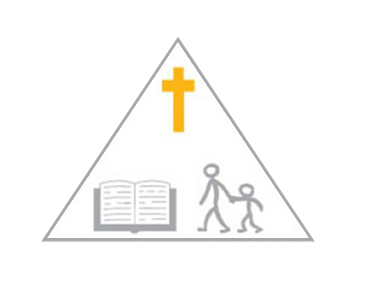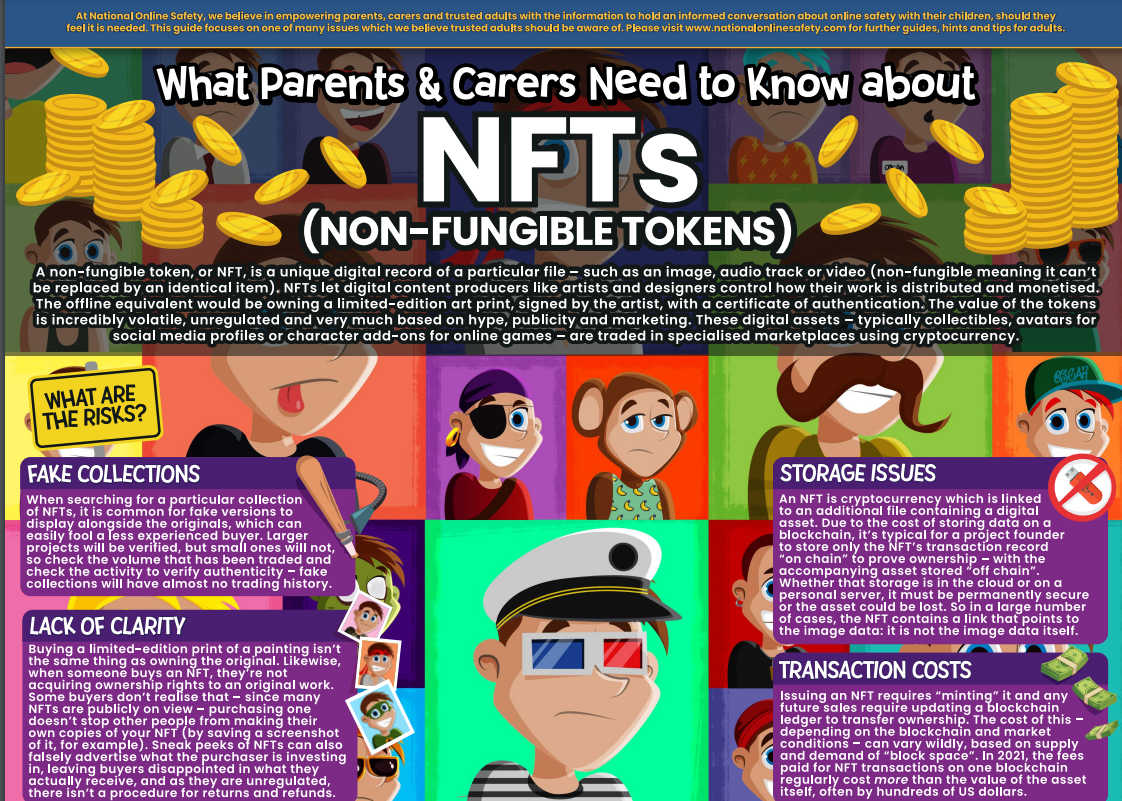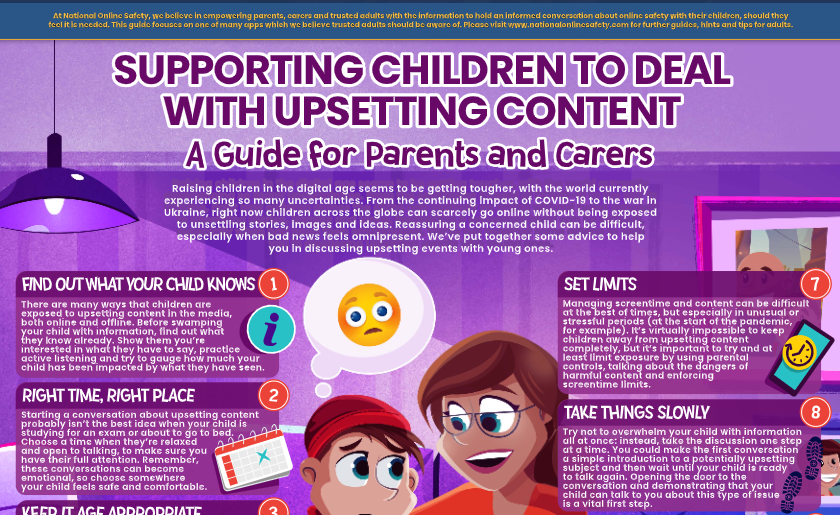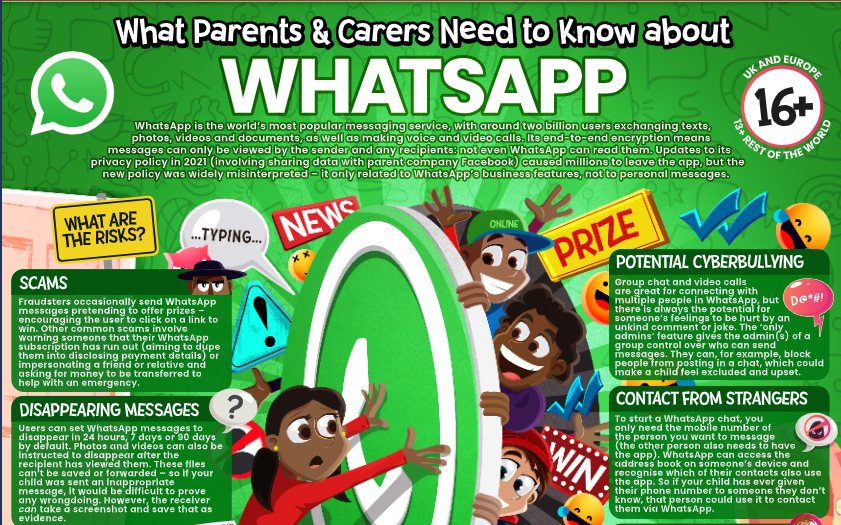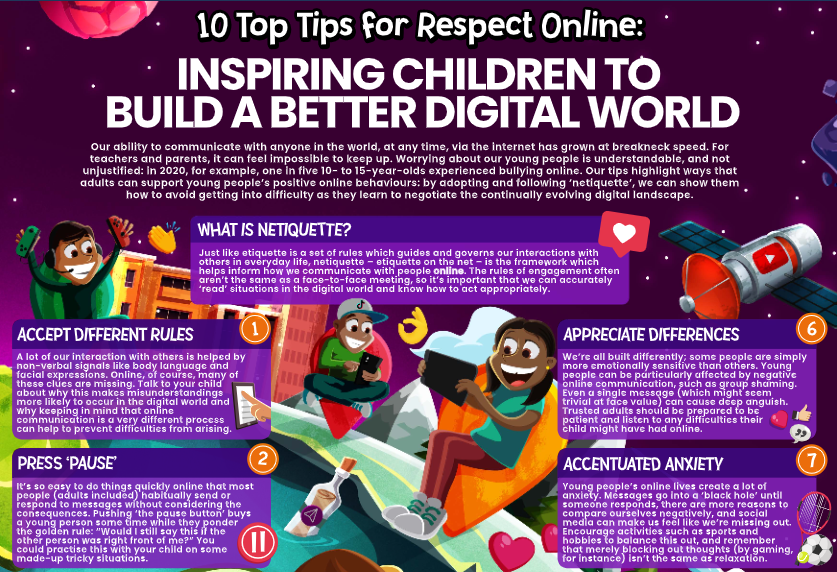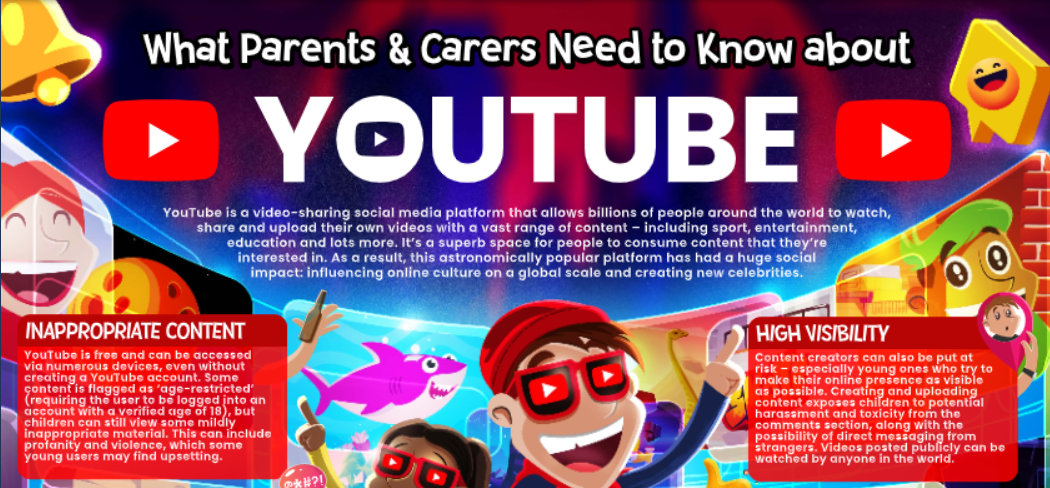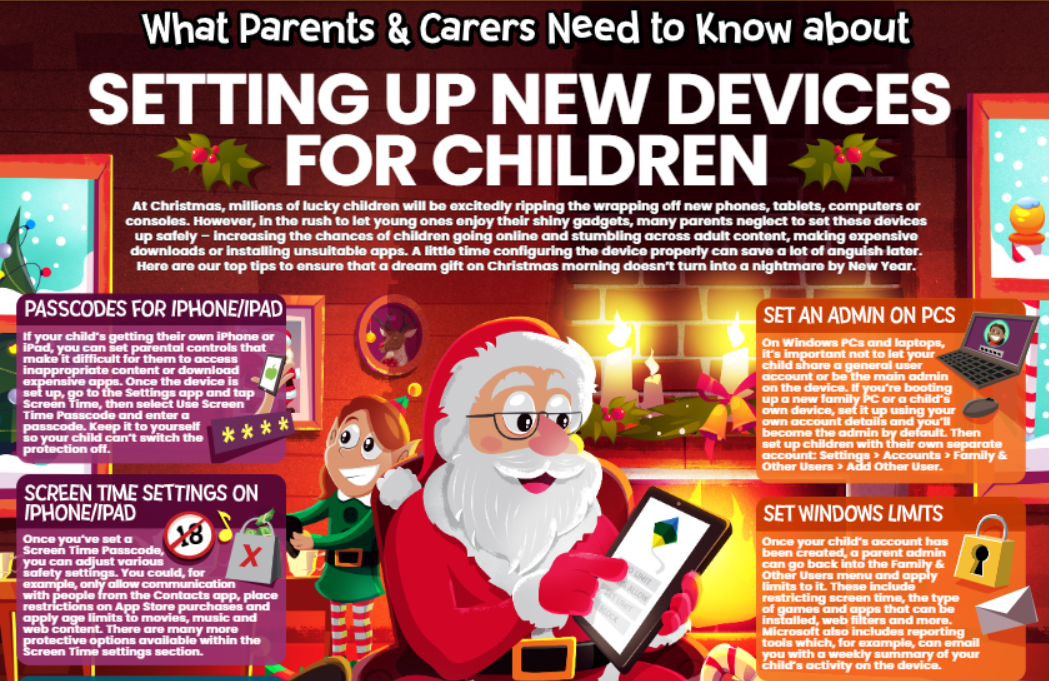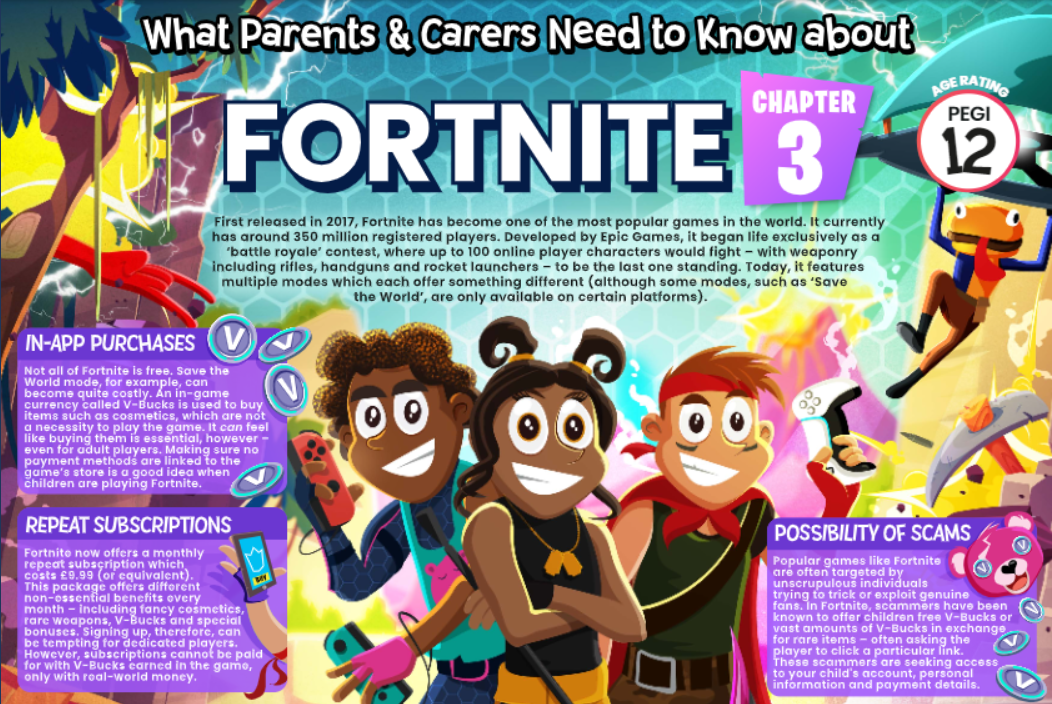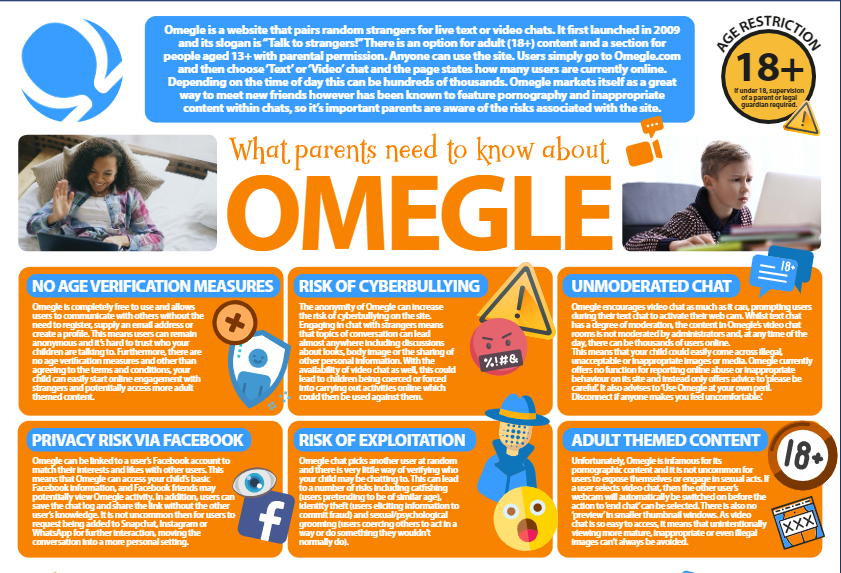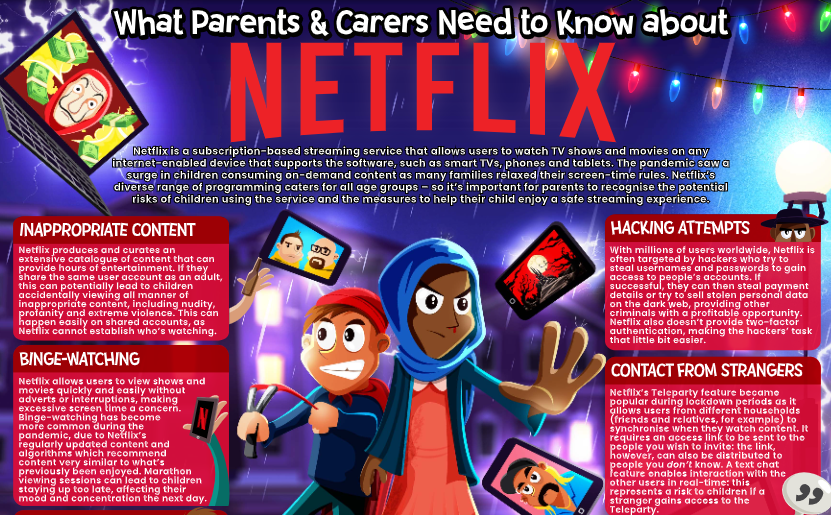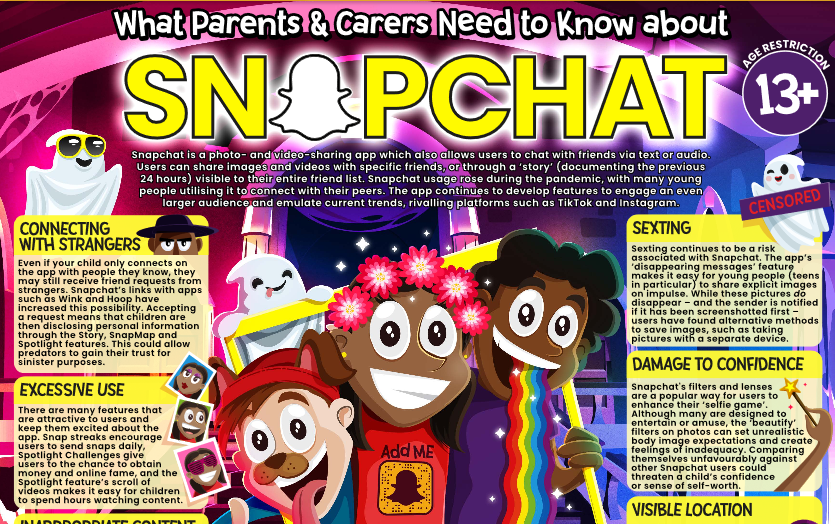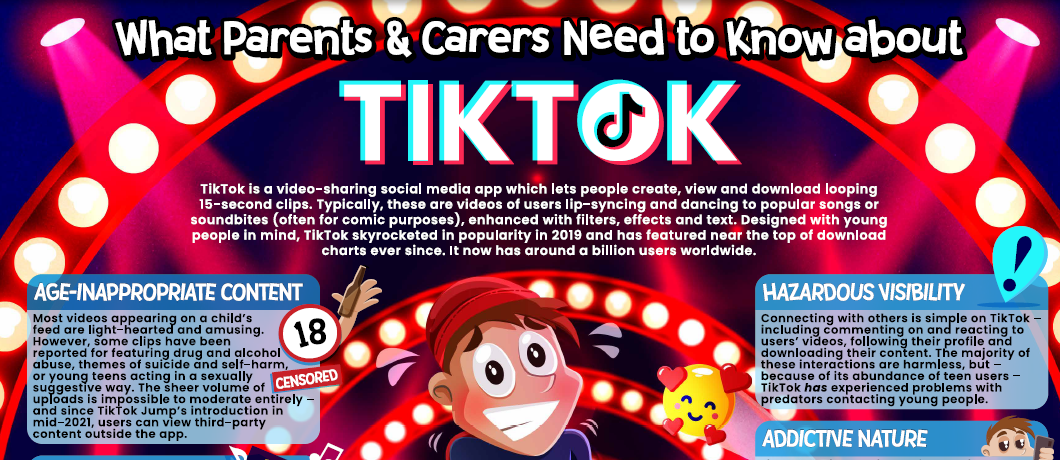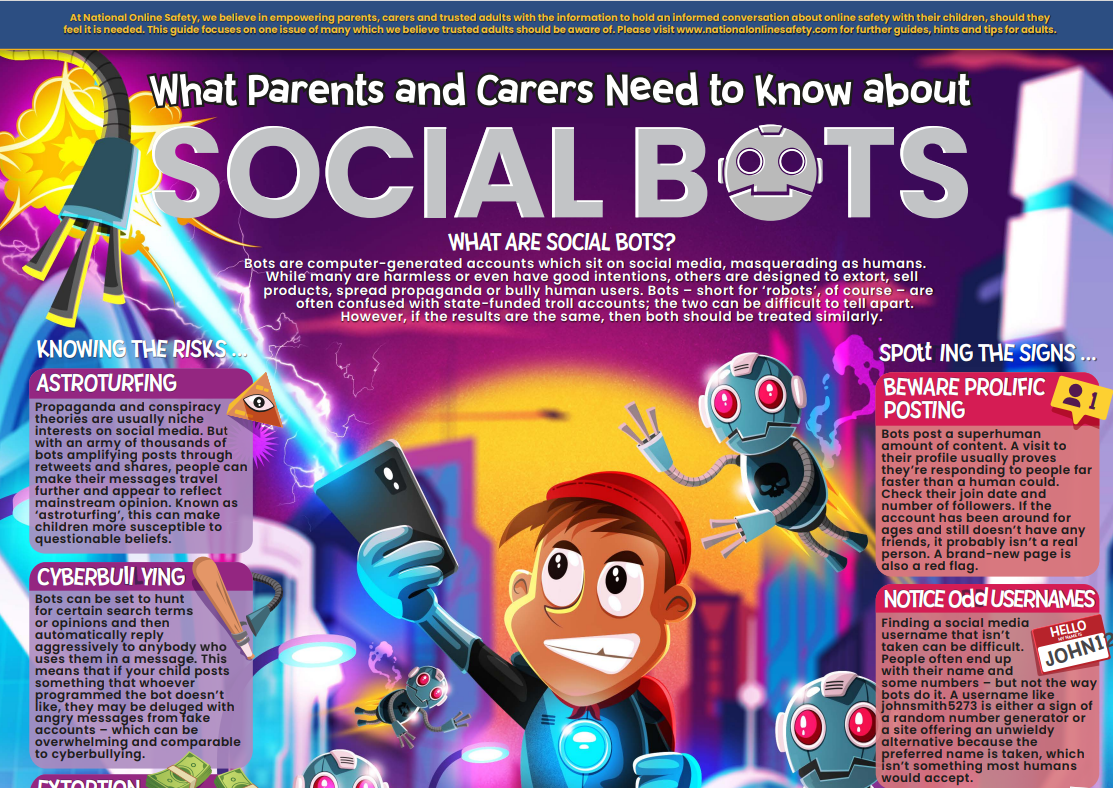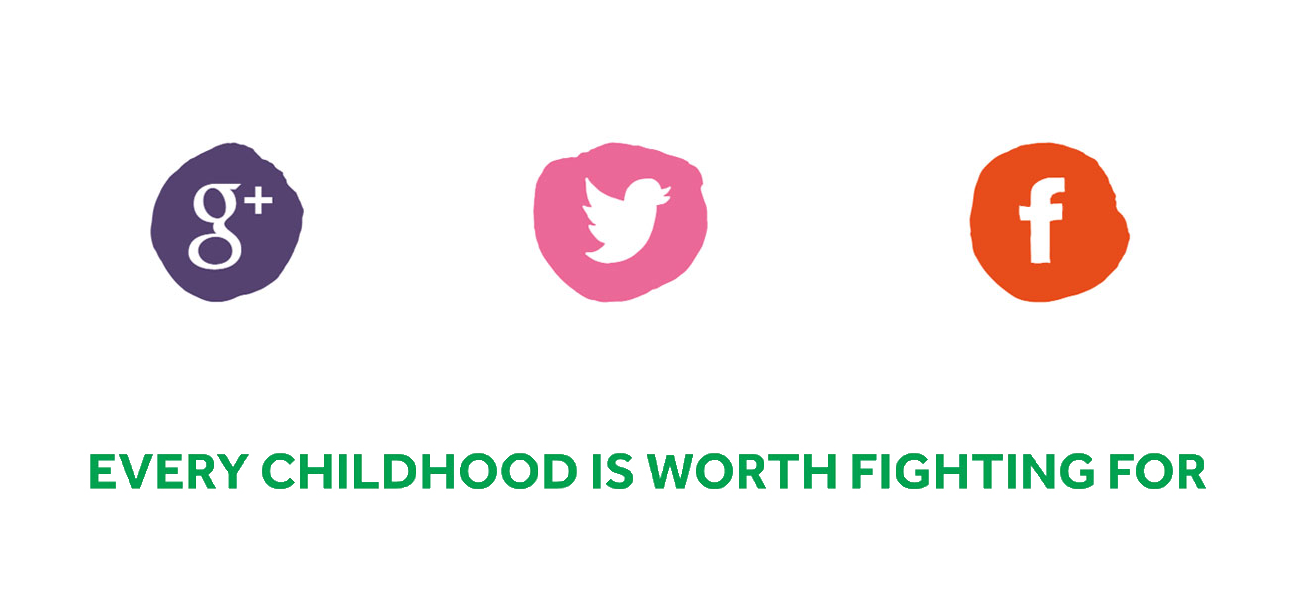Dear Parents
On our most recent newsletter we shared the Ofcom report into media use and attitudes. This showed that parents and carers are concerned about their child's use of media devices on a range of platforms.
Below you will find links to helpful documents and websites to inform you of current issues regarding online safety for your children.
Parent and carer guide on NFTs
A non-fungible token, or NFT, is a unique digital record of a particular file – such as an image, audio track or video (non-fungible meaning it can’t be replaced by an identical item). NFTs let digital content producers like artists and designers control how their work is distributed and monetised. The offline equivalent would be owning a limited-edition art print, signed by the artist, with a certificate of authentication. The value of NFTs is incredibly volatile, unregulated and very much based on hype, publicity and marketing. These digital assets – typically collectibles, avatars for social media profiles or character add-ons for online games – are traded in specialised marketplaces using cryptocurrency.
In the guide, you'll find tips on a number of potential risks such as IP theft, scams and financial loss. Read more on the attached guide from National Online Safety website below.
Parent and carer guide on Supporting Children to Deal with upsetting Content
This week's guide addresses the timely and delicate issue of speaking with children about worrying content they've seen online. Young people are so connected to the world through their devices that, by now, the vast majority will be acutely aware of the situation in Ukraine, even if they're not quite old enough to comprehend it fully.
Many will have watched or read potentially upsetting news items online covering the invasion - and, in all likelihood, will need extra reassurance from trusted adults during these unsettling days. Our guide has practical advice on raising the subject with young ones, allowing them to express their concerns, and helping them to avoid feeling overwhelmed by their fears. Read more on the attached guide from National Online Safety website below.
What Parents and Carers Need to Know about WhatsApp
WhatsApp is the world’s most popular messaging service, with around two billion users exchanging texts, photos, videos and documents, as well as making voice and video calls. Its end-to-end encryption means messages can only be viewed by the sender and any recipients: not even WhatsApp can read them. Updates to its privacy policy in 2021 (involving sharing data with parent company Facebook) caused millions to leave the app, but the new policy was widely misinterpreted – it only related to WhatsApp’s business features, not to personal messages. In the guide, you'll find tips on a number of potential risks such as scams, strangers and location sharing. Read more on the attached guide from National Online Safety website below.
What parents and carers NEED TO KNOW - 10 Top Tips for Respect Online: Inspiring Children to Build a Better Digital World
Even before lockdowns inflamed the situation, one in every five 10- to 15-year-olds was experiencing bullying online: abusive messages, having rumours spread about them or being excluded from group chats, for example. Through smartphones and tablets, we’re used to being able to communicate from anywhere, at any time – but digital devices became commonplace so quickly that it caused a problem: as a society, we haven’t properly adjusted to how different they’ve made life. Our top tips can help you to build positive relationships online and avoid some of the potential issues.
In the guide, you'll find a number of tips such as how to stop internet addiction, being aware of the dark side, and pressing ‘pause’.
Read more on the attached guide from National Online Safety website below.
What parents and carers need to know about Youtube
YouTube is a video-sharing social media platform that allows billions of people around the world to watch, share and upload their own videos with a vast range of content – including sport, entertainment, education and lots more. It’s a superb space for people to consume content that they’re interested in. As a result, this astronomically popular platform has had a huge social impact: influencing online culture on a global scale and creating new celebrities.
In the guide, you'll find tips on a number of potential risks such as connecting with strangers, inappropriate content and high visibility. Read more on the attached guide from National Online Safety website below.
What parents and carers need to know about setting up new devices
Some adults may shy away from adjusting the parental controls on their child’s digital devices, assuming that they’ll be hard to understand and tricky to set up. In most cases, however, it’s refreshingly straightforward: just a few clicks of a mouse or touches of a screen can provide an extra layer of protection for children using those devices to explore the online world.
From restricting inappropriate content and blocking in-app purchases to setting automatic screen-time limits and restricting who can contact your child online, our #WakeUpWednesday guide this week has some useful Yuletide tips. We’ll show you how to set up devices so that when your child uses them to go online, you can be more confident about their safety. Read more on the attached guide from National Online Safety website below.
What parents and carers need to know about Fortnite Chapter 3
Fortnite is one of those rare titles which breaks through from the gaming world to create a wider cultural impact. This success was swiftly monetised, of course, leading to Fortnite action figures, plush toys, branded clothing, stationery, bedspreads and the like. The nature of these products hints at a sizeable proportion of the game’s fans being below the recommended age limit of 12.
So how much of a danger does Fortnite pose to its younger players? For starters, the game is fundamentally about using an array of weaponry to eliminate a stream of enemies. As our #WakeUpWednesday guide outlines, however, on-screen violence is far from the highest concern – with potential issues over in-app purchasing, scams and toxic behaviour from other players. Read more on the attached guide from National Online Safety website below.
What parents and carers need to know about Omegle
Children being inadvertently exposed to upsetting or frightening age-inappropriate content is an obvious issue with Omegle. Read more on the attached guide from National Online Safety website below.
What parents and carers need to know about netflix
Children being inadvertently exposed to upsetting or frightening age-inappropriate content is an obvious issue with Netflix if young users don’t have their own profile or adult content isn’t restricted. As our #WakeUpWednesday guide this week explains, however, it isn’t the only risk that’s associated with the massively popular streaming service.
The sheer number of Netflix subscribers makes the platform an appealing target for hackers looking to harvest personal data from unprotected accounts, while the incredible breadth of content makes binge-watching and screen addiction potential problems, too. Our free guide reminds parents and carers of the essential ways to keep Netflix safe for their children to watch.
Read more on the attached guide from National Online Safety website below.
What parents and carers need to know about Snapchat
When Snapchat’s number of active users plateaued at around the 180 million mark for the majority of 2018, many observers surmised that the platform had become ‘old hat’ in the eyes of its younger fan-base. A continuous (and lockdown-abetted) recovery since then, however, has proved that reports of the app’s demise had been greatly exaggerated.
Snapchat’s willingness to move with the times, strategically adding new features such as Spotlight and Snap Map, has kept it relevant and appealing. Each fresh tweak, however, provides potential scope for new harms – whether deliberately or accidentally inflicted. This week’s #WakeUpWednesday guide focuses its discerning lens onto Snapchat.
Please find full guide attached below from National Online Safety website.
What parents and carers need to know about TikTok
TikTok has quickly become one of the world’s most downloaded apps. There are now around a billion TikTok users worldwide, almost half of whom (41%) are in the 16–24 age bracket. TikTok itself advises a minimum age of 13 to access the platform, but reports suggest that some children as young as 10 use it.
Like all social media platforms, TikTok is constantly evolving and has recently brought out features linked to in-app spending as well as accessing third-party content through TikTok Jump. That’s why this week’s #WakeUpWednesday guide provides a fresh look at the hugely popular video-sharing app.
Please find full guide attached below from National Online Safety website.
What parents and carers need to know about social bots - guide from National online safety
Around one in every three people has been fooled (even if only briefly) into thinking a social media bot was a real person. Evidence suggests that bots are increasingly being used on social platforms to artificially amplify the popularity of a person or movement, to influence political outcomes and as accessories in phishing scams – so their ability to deceive us is becoming more of a concern.
Twisting public debate, disrupting online courtesy and – in some cases – jeopardising human wellbeing are among the more worrying threats that bots can pose. In our #WakeUpWednesday guide this week, you’ll find useful tips on how to identify bots on social media – including giveaways like odd usernames, unusual patterns of posting and dubious profile pictures.
Please find full guide attached below.
Please see new guides below for how to set parental control on Iphones and Android phones.
The new kid on the block - What parents need to know about the Monkey app
What is it?
Monkey is a social networking app that allows users to video chat with other users randomly chosen by the app. Once downloaded, the app will the user’s name, age, user name, gender, and phone number. After that, the app begins connecting the user with someone to video chat with, by pairing them by age groups and other variables such as hashtags. The user can skip or accept a connection. The calls typically last 15 seconds, but if the users are both enjoying the interaction, they can request more time by tapping the countdown clock on the screen. For the conversation to continue, both chatters must do this.
Read more here: Link to more information on this app
Follow the links for more online help:
Help keep children safe online - Donate Here
We have changed our email address - please add our new one to your safe senders list
Be Share Aware - keep children safe online.
We tell children it's good to share - but sharing online is different. In fact sometimes it can be dangerous and that's why we're asking parents to be Share Aware - to keep children safe online. However, we can’t do this alone and we need your help to spread the word.
Find out more
Share Aware is for parents and carers of children aged 8-12 providing straightforward, simple advice to help untangle the web, understand what their children may be doing online, and feel confident in talking to them about how to stay safe.
We know many parents feel confused by the internet. But we also know that having conversations early helps build trust and openness. Our campaign aims to equip parents with the tools to do so.
What can you do?
Visit the Share Aware homepage - here you can find top tips for being Share Aware and view our no-nonsense guide to the social networks, sites and apps children use - based on the experience of parents and young people themselves.
Help us spread the word - we want all parents to know how to be Share Aware, and we need your help to do so. Please share our short video on social media and help us get #ShareAware trending or tell your family and friends to tune in to Coronation Street tonight to watch a special showing of the video in the break.
The internet is a great place for children to be. Being Share Aware makes it safer.
Thank you.
Lisa Watch
Campaigns Manager NSPCC
Find out more about the campaign or watch the videos at: www.nspcc.org.uk/shareaware
Forward this to a friend
